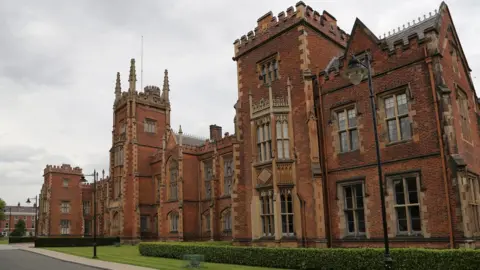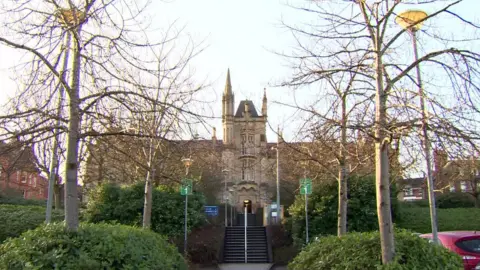Coronavirus: Northern Ireland universities face losing ''more than £140m'
 Getty Images
Getty ImagesUniversities in Northern Ireland face multi-million-pound losses due to the coronavirus pandemic.
Queen's University (QUB) could face up losses of up to £80m in a worst case scenario.
Ulster University (UU) could face losses of up to £64m over a three year period.
The figures were revealed by the vice-chancellors of both universities to MLAs on Stormont's economy committee.
The vice-chancellor of QUB, Prof Ian Greer, said the forecast losses were because of a number of factors.
Prof Greer said UK universities as a whole expected to lose £2.4bn in international student fees this year, which he described as a "massive hit".
"For Northern Ireland, London Economics have forecast a £29m hit on teaching income alone before we add losses from accommodation, conferencing etc," he said.
"And for Queen's, our forecast losses look to be in the range of £34m to over £80m."
Tuition fees from international students brought in about £36m in 2018-19, about 10% of the university's income.

Professor Greer said releasing students early from their accommodation contracts in March had cost Queen's £3.5m.
Ulster University made a similar move at a similar cost.
The vice-chancellor of UU, Prof Paul Bartholomew, also revealed what financial losses it is facing.
"I would estimate our projected deficits are in the region of about £25m to £64m over about a three-year period," he told MLAs.
"It's quite broad because we don't know how long lockdown is going to go on and so forth."
Preparing for all eventualities
Both universities say they want the Department for the Economy (DfE) to lift the cap on the number of students from Northern Ireland they can admit in 2020 to make up for a potential loss of overseas students.
DfE controls the number of undergraduate places available at QUB and UU for students from Northern Ireland.
DfE set a maximum aggregate student numbers (MASN) cap at both universities based on financial calculations.
About a third of students from of Northern Ireland enter universities elsewhere in the UK every year.
Prof Greer said: "None of us can predict whether the campuses will be fully open as normal or whether we'll still have to have some online or whether we have some sort of blended approach."
He said QUB was preparing for all eventualities.
BBC News NI understands those contingencies include a later start to the 2020-21 university term for some students and some students beginning the academic year being taught online rather than physically on campus.
'Safety our priority'
In a separate statement, QUB said it was "developing a number of contingency plans which are underpinned by revenue projections based on possible future scenarios."
"The safety of our staff and students remains our priority and we will continue to take all necessary steps to protect the health and wellbeing of our current and future students.
"As with all other universities, to ensure that studies are not disrupted more than necessary the university is working on contingency measures for the forthcoming academic year.
"We are aiming to begin teaching at the normal time and will continue to be agile in meeting the needs of students.
"We have explored a range options, including additional entry points for some courses and online delivery of teaching if necessary.
"It is not yet known if these contingency measures will be applied but they will be implemented as required to ensure we can continue to provide a high quality education while protecting the health and wellbeing of our students."
